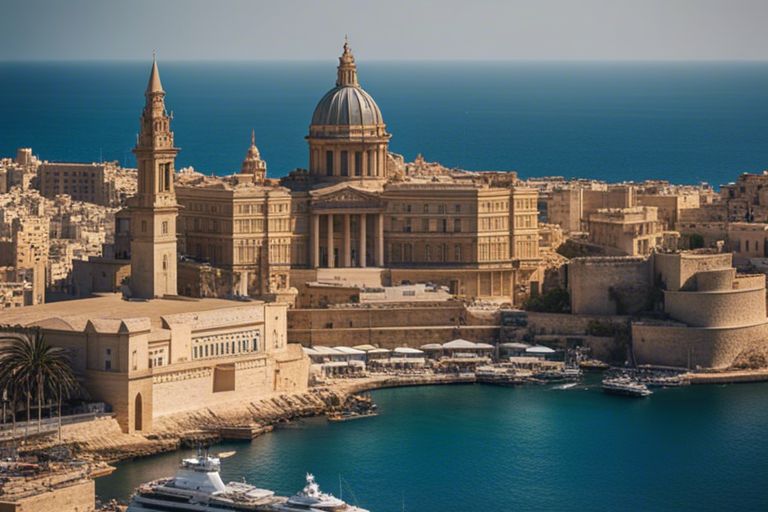Malta’s Business Landscape in 2024

Business evolution in Malta provides a compelling narrative as we explore into the prospects and challenges that define its landscape in 2024. With technological advancements driving growth and global connectivity at an all-time high, Maltese businesses have seen a remarkable shift. However, amidst the promising trajectory lie regulatory uncertainties and economic fluctuations that demand attention. Understanding the intricate balance between innovation and compliance will be pivotal for organizations aiming to navigate through the dynamic terrain of Malta’s business realm in the coming years. Join us as we explore the trends and strategies shaping the future of business in this vibrant Mediterranean island nation.
Industry Analysis
Key Growth Sectors
The Maltese business landscape in 2024 is marked by significant growth in key sectors such as technology, tourism, and financial services. Technology companies are flourishing due to government initiatives supporting innovation and digital transformation. Tourism continues to thrive with sustainable practices and luxury offerings attracting high-end travelers. Financial services are expanding, bolstered by Malta’s reputation as a reputable jurisdiction for fintech companies.
Emerging Business Opportunities
On the horizon, renewable energy presents substantial opportunities for investment and development in Malta. The country’s strategic location and commitment to sustainability make it an ideal hub for renewable energy projects. Startups in various industries are also gaining traction, with government support and access to incubation programs fostering a favorable environment for entrepreneurial endeavors.
An increasing emphasis on innovation and diversification is driving the emergence of new business opportunities in Malta. Companies that can adapt to evolving market demands and leverage the country’s business-friendly policies are poised for success in this dynamic landscape.
With digitalization transforming traditional industries and consumer behaviors, businesses in Malta need to stay agile and embrace technological advancements to remain competitive. Those that prioritize innovation and sustainability will be well-positioned to capitalize on the opportunities presented by Malta’s evolving business landscape.
Business Infrastructure
Technological Advancements
There’s no denying that Malta’s business landscape in 2024 is heavily influenced by rapid technological advancements. From blockchain technology to AI integration, businesses are harnessing the power of innovation to stay competitive in the global market.
Support and Logistics
For businesses operating in Malta, the support and logistics infrastructure has undergone significant improvements. Efficient transportation networks and updated trade regulations have streamlined the process of importing and exporting goods. Additionally, government initiatives have made it easier for companies to set up and operate in Malta, reducing bureaucratic red tape.
Plus, the presence of state-of-the-art facilities such as co-working spaces and business incubators provide a conducive environment for startups and established companies alike. The focus on sustainability in logistics practices further enhances Malta’s appeal as a hub for business growth and innovation.
Government Policies and Business Climate
Incentives and Regulations
For businesses looking to establish themselves in Malta, the government has continued to offer a range of incentives and a favorable regulatory environment. Investment tax credits, grants for job creation, and support for research and development are some of the key initiatives in place to attract and retain businesses in the country. Regulations are streamlined to facilitate business operations while ensuring compliance with international standards.
International Relations and Trade
On the international front, Malta has fostered strong relationships and trade partnerships with neighboring countries and beyond. Strategic alliances within the European Union and agreements with other global partners have enabled Malta to expand its market reach and attract foreign investment. The country’s commitment to free trade has positioned it as a favorable destination for businesses looking to tap into international markets.
Trade: Malta’s proactive approach to international relations and trade has opened up opportunities for businesses to access new markets and forge strategic partnerships. The country’s membership in the European Union provides businesses with a gateway to a larger market while its trade agreements with various countries offer a competitive edge in global trade.
Workforce and Education
Talent Development Initiatives
Initiatives in Malta have been focusing heavily on talent development in recent years. Unlike traditional approaches, new programs prioritize upskilling and reskilling to meet the demands of a rapidly evolving business landscape. Enhanced partnerships between businesses and educational institutions have enabled the design of tailored training programs that address specific industry needs. These initiatives aim to bridge the skills gap and ensure that the workforce remains competitive in an increasingly digital and global economy.
Labor Market Trends
Education in Malta has been adapting to the shifting labor market trends to meet the needs of the future workforce. With a focus on digital skills, entrepreneurship, and innovation, educational institutions are revamping their curricula to equip students with the necessary tools for success in the modern workplace. Flexible learning options and practical experience opportunities are also being prioritized to ensure that graduates are not only knowledgeable but also well-prepared for the challenges they may face in their careers.
Challenges and Risks
Economic Vulnerabilities
On the economic front, Malta faces several vulnerabilities that could impact its business landscape. The country’s dependence on tourism and financial services makes it susceptible to global economic downturns and shifts in consumer preferences. Government debt levels and trade imbalances are also areas of concern, which could threaten the stability of the economy if not carefully managed.
Competitive Pressures
To stay ahead in a competitive global market, Maltese businesses need to navigate intense competitive pressures. Local companies must contend with rivals not only from within the country but also from international markets. For instance, the rise of digital transformation and technological advancements has accelerated competition, requiring businesses to adapt quickly or risk being left behind.
For instance, the emergence of new international players entering Malta’s key industries poses a threat to local businesses, challenging them to innovate and enhance their competitive edge. On a positive note, this competition can drive businesses to improve their products and services, ultimately benefiting consumers. However, businesses will need to continuously evaluate and adjust their strategies to keep up with evolving market dynamics.
The Future Outlook
Predictions for Malta’s Business Landscape
With technology advancing rapidly and the global market constantly evolving, it is predicted that Malta’s business landscape in 2024 will see a significant shift towards digitalization and innovation. Industries such as fintech, biotech, and AI are expected to thrive, attracting more foreign investments and creating new job opportunities.
Strategic Planning for Sustainable Growth
Predictions indicate that companies in Malta will need to focus on strategic planning for sustainable growth to stay competitive in the ever-changing business environment. This includes investing in green technologies, embracing diversity and inclusion, and adapting to new regulations and market trends.
To ensure long-term success, businesses should adopt a forward-thinking approach and incorporate sustainable practices into their operations. By prioritizing innovation and flexibility, companies can position themselves for growth while mitigating risks associated with external uncertainties.
To wrap up
So, Malta’s business landscape in 2024 demonstrates a resilient and innovative economy that continues to attract investors and entrepreneurs from around the globe. With a strong focus on technology, sustainability, and digital transformation, businesses in Malta are poised for growth and success. The government’s commitment to creating a conducive environment for business development, coupled with a skilled workforce and strategic location, further solidifies Malta’s position as a premier business destination. As we look to the future, the opportunities for expansion and prosperity in Malta’s business landscape remain abundant, promising a bright outlook for the years to come.
FAQs:
What are the key growth sectors driving Malta’s business landscape in 2024?
Technology, tourism, and financial services are the key growth sectors in Malta. Government initiatives supporting innovation and sustainability have contributed to the flourishing of these sectors.
What emerging business opportunities are on the horizon in Malta?
Renewable energy presents substantial investment opportunities in Malta due to its strategic location and commitment to sustainability. Additionally, startups across various industries are gaining traction, supported by government initiatives and access to incubation programs.
How is digitalization shaping traditional industries in Malta?
Digitalization is transforming traditional industries and consumer behaviors in Malta. Businesses need to stay agile and embrace technological advancements to remain competitive in the global market.
What government policies and incentives are in place to support businesses in Malta?
The Maltese government offers various incentives such as investment tax credits, grants for job creation, and support for research and development to attract and retain businesses. Regulations are streamlined to facilitate business operations while ensuring compliance with international standards.
What predictions are there for Malta’s business landscape in the future?
Predictions suggest a significant shift towards digitalization and innovation in Malta’s business landscape. Industries such as fintech, biotech, and AI are expected to thrive, attracting more foreign investments and creating new job opportunities.
Recommended Posts

Feedback – What Players Want from Bonuses
May 17, 2024

Malta’s Coastal Drives for Road Trippers
May 17, 2024

Overview of Business Finance in Malta
May 17, 2024




